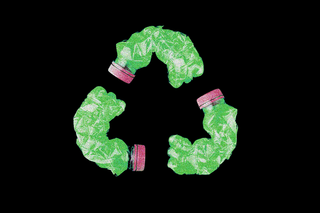
Plastic Recycling Is a ‘Failed Concept,’ Says New Report
While industries peddle dreams of a circular economy, the impacts of toxic plastic pollution are borne by the most vulnerable communities.

Recycling has long been touted as a solution to the global problem of plastic pollution. It sounds good in theory: the large amounts of plastic waste generated by households and industries can be used to fashion new products — preventing their accumulation in landfills where they will otherwise be burned or persist for thousands of years, polluting the soil with toxic chemicals and posing a severe environmental and health hazard. What’s more, it could mean leaving fossil fuels in the ground. However, a new report claims plastic recycling is a “failed concept,” as “most plastic simply cannot be recycled.”
Greenpeace USA, in their report, revealed that plastic recycling rates are continuously falling, even as production rises. In 2021, US households generated 51 million tons of plastic waste. Of this, only 2.4 million tons — a mere 5% — was recycled, the study found. It further added that in the US, which formed the focus of the study, no type of plastic packaging meets the standards of being classified as “recyclable.”
Over time, the narrative around plastic recycling has centralized individual responsibility over industrial change. “The plastics and products industries have been promoting plastic recycling as the solution to plastic waste since the early 1990s,” the report notes. While industries continue to peddle dreams of achieving a circular economy through recycling, the impacts of toxic plastic pollution and recycling are disproportionately borne by the most vulnerable communities. The new report dashes hopes of the “imagined benefits” of this project, highlighting the “decades-long misinformation campaign” by industries that has perpetuated the “myth” that plastic can be recycled.
“More plastic is being produced, and an even smaller percentage of it is being recycled. The crisis just gets worse and worse, and, without drastic change, will continue to worsen as the industry plans to triple plastic production by 2050,” said Lisa Ramsden, Senior Plastics Campaigner at Greenpeace USA. The potential increasein plastic production adds to the burgeoning problem of waste generation. After all, new plastic is cheaper to produce and of a higher quality than recycled plastic, states the report. The petrochemical industry is also rapidly expanding, lowering the costs of new plastic.
Related on The Swaddle:
Coca‑Cola, PepsiCo, Nestlé Named World’s Biggest Plastic Polluting Brands For Third Consecutive Year
According to the report, there are five key problems associated with plastic recycling. Plastic waste is extremely difficult to collect and almost impossible to separate and sort before recycling, which is a crucial step as mixed plastic cannot be recycled together. Further, the recycling process itself is harmful to the environment as it exposes workers to toxic chemicals and generates microplastics. The process is expensive, making the entire project unfeasible. The toxicity of plastic as a material is another major barrier, as recycled plastic runs the risk of being contaminated with other plastic in collection bins, making it unusable as food-grade material.
Plastic recycling in the US reached its peak in 2014 at around 10% and has since been on a downward trend. The report highlighted how recycling rates have fallen since China stopped accepting US plastic waste in 2018. Previously, the US would export millions of tons of plastic waste to China, counting it as recycled even though most of this waste was incinerated or dumped in landfills, the report noted. A report in The Conversation stated that once China announced its ban on the import of plastic waste, the export was shifted to African countries, with most of this difficult-to-recycle plastic ending up in oceans and rivers as they lacked the infrastructure to effectively process the waste.
This reveals another systemic issue with plastic waste — while high-income countries have historically generated more plastic waste per capita, most of this waste has been offshored over the years to developing countries. This “plastic waste trade” is supposed to generate economic opportunities for the poor, however, these benefits are immediately offset by the environmental and health risks that come with handling toxic chemicals that can cause cancer, respiratory illnesses, and harm reproductive systems.
The report advocated a move towards phasing out single-use plastic, standardizing reusable packaging, adopting a global treaty, and prioritizing reuse and refill strategies, instead of recycling. AFP, reporting on the recent survey’s findings, further highlighted how several countries are leading the way in addressing plastic waste, including India which banned 19 single-use plastic items earlier this year.
Related on The Swaddle:
Plastic Pollution in the Oceans Is On Track to Triple by 2040: Study
However, India’s tryst with plastic pollution is riddled with hurdles of its own. Three months into the ban, an IndiaSpendreport found that most of these single-use plastic items are still in circulation. If the ban had worked, it would have accounted for only 2-3% of the plastic waste generated in India. Moreover, experts pointed out that the ban fails to hold big players accountable. Instead, it targets the most vulnerable — the hawkers and vendors who form the smallest segment of the plastic industry and require “maximum hand holding in order to transition away from single-use plastic.”
The fossil fuel industry and the plastic problem are deeply intertwined, since over 99% of plastic is made from fossil fuels. A 2020 investigation by NPR found that industry officials had misled the public about plastic being recyclable, even though they knew this material could not be economically recycled since the 1970s. Despite this knowledge, the “industry spent millions telling people to recycle.”
Highlighting the role of industries in fuelling the demand for plastic, Alice Mah, professor of Sociology at theUniversity of Warwick wrote in The Conversation, “It has denied the toxic hazards of myriad petrochemicals and plastic products, funded climate misinformation campaigns, misled the public about the effectiveness of recycling, and lobbied to thwart and delay environmental regulations. During the pandemic, it also lobbied to promote single-use plastic bags as the “sanitary choice”.
The plastics industry championing the cause of recycling has only served to greenwash the plastic crisis and diverted attention from the environmental justice problem it poses. The recycling narrative has also been effective in shifting the onus of addressing the plastic problem onto individuals. “Industry groups and big corporations have been pushing for recycling as a solution… By doing that, they have shirked all responsibility,” Ramsden told AFP. “We are at a decision point on plastic pollution. It is time for corporations to turn off the plastic tap,” she said.
Ananya Singh is a Senior Staff Writer at TheSwaddle. She has previously worked as a journalist, researcher and copy editor. Her work explores the intersection of environment, gender and health, with a focus on social and climate justice.
Related


Scientists Are Employing 3D Printing to Devise Treatments for Breast Cancer
